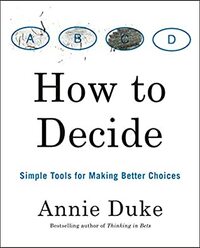Take a photo of a barcode or cover
For the first few chapters I felt like this book was targeted to people who are extremely paralyzed by decisions, but in the final few chapters the book won me over with some useful tools for group decision making.
This book includes lots of exercises best done with paper and pencil, which definitely slowed me down working my way through it - but I found them to be worthwhile.
This book includes lots of exercises best done with paper and pencil, which definitely slowed me down working my way through it - but I found them to be worthwhile.
I think the first 30% of the book was really helpful and gave me some new tools in decision making. But I also felt like it just kept getting bogged down with endless explanations, etc. and ultimately thought the book could have been condensed. After taking a break from the book and then returning to it, I found I just did not care to finish it.
informative
reflective
medium-paced
"How to Decide" by Annie Duke is a compelling guide to improving decision-making. The author, a former professional poker player, explores how decisions are influenced by quality and luck. She encourages readers to focus on the decision process rather than just the outcomes.
A key point is understanding the why behind your decisions—success or failure should not solely define their quality. The suggests keeping a decision journal to avoid hindsight bias, and stresses the importance of evaluating the pros and cons based on your goals. She also offers practical advice on estimating probabilities and seeking external perspectives to make informed choices.
The authors' pragmatic approach includes making quicker decisions when stakes are low and using tools like the Only-Option method to resolve indecision. This book teaches that the journey to a decision is as important as the result, emphasizing the role of luck and the process itself.
That all being said, I found some parts of the book repetitive.
Overall, I recommend "How to Decide" to anyone looking to refine their decision-making skills. It’s insightful, practical, and engaging.
A key point is understanding the why behind your decisions—success or failure should not solely define their quality. The suggests keeping a decision journal to avoid hindsight bias, and stresses the importance of evaluating the pros and cons based on your goals. She also offers practical advice on estimating probabilities and seeking external perspectives to make informed choices.
The authors' pragmatic approach includes making quicker decisions when stakes are low and using tools like the Only-Option method to resolve indecision. This book teaches that the journey to a decision is as important as the result, emphasizing the role of luck and the process itself.
That all being said, I found some parts of the book repetitive.
Overall, I recommend "How to Decide" to anyone looking to refine their decision-making skills. It’s insightful, practical, and engaging.
hopeful
informative
inspiring
reflective
medium-paced
informative
reflective
slow-paced
In one of his podcasts, Study-tube influencer Thomas Frank talked mentioned the author who is a celebrated poker player and her interdisciplinary approach to decision making(I mean she is using poker winning skills and applying the lessons she learned to decision making process in real life) had me fascinated.
The author's approach to viewing decisions through the lens of "Resulting" and some other biases isn't fresh but engaging. The author gave never before hear dimensions to why journaling is a necessary habit for decision making. Given my 9ish year long journaling habit, I felt pretty validated.
It is feels useful to look at life choices in terms of decision trees and probability clouds.
But, I dunno. I'm generally skeptical about these things. In the least, the book will help you to guide yourself away from both maladaptive self-criticism and self-appreciation.
I would also recommend people to read Michael Sandel's Tyranny of Merit alongside. While this book addresses certain cognitive biases associated with the ideas of winning and losing, Tyranny of Merit explores the political and social outcomes which I feel are closely related to the biases addressed in this book.
The author's approach to viewing decisions through the lens of "Resulting" and some other biases isn't fresh but engaging. The author gave never before hear dimensions to why journaling is a necessary habit for decision making. Given my 9ish year long journaling habit, I felt pretty validated.
It is feels useful to look at life choices in terms of decision trees and probability clouds.
But, I dunno. I'm generally skeptical about these things. In the least, the book will help you to guide yourself away from both maladaptive self-criticism and self-appreciation.
I would also recommend people to read Michael Sandel's Tyranny of Merit alongside. While this book addresses certain cognitive biases associated with the ideas of winning and losing, Tyranny of Merit explores the political and social outcomes which I feel are closely related to the biases addressed in this book.
On my Twitter account, I asked how many people have trouble making decisions, and over 50% of people said yes.
I fell in love with Annie Duke's work after I read her last book Thinking in Bets, and I've been eagerly waiting for this book to come out for months. Annie is a former professional poker player who also studies psychology, so her perspective is extremely unique. At first, when I started reading this book, it felt like a lot of repeat information from her previous book, but I was extremely wrong. Annie not only presents a lot of new information, but she provides practical examples of when and how we make decisions, and the physical copy of the book comes with a lot of different exercises to try out.
Recently, I became interested in risk assessment, and it blends perfectly with learning about how to make better decisions. We make hundreds of small decisions a day, and there are opportunity costs to most of them. Then, we have to make bigger decisions about job changes and relationships, which can be extremely stressful. Annie sets the foundation by explaining how we don't have control over the results, but we have a lot of strategies we can use to make the best decisions possible.
I fell in love with Annie Duke's work after I read her last book Thinking in Bets, and I've been eagerly waiting for this book to come out for months. Annie is a former professional poker player who also studies psychology, so her perspective is extremely unique. At first, when I started reading this book, it felt like a lot of repeat information from her previous book, but I was extremely wrong. Annie not only presents a lot of new information, but she provides practical examples of when and how we make decisions, and the physical copy of the book comes with a lot of different exercises to try out.
Recently, I became interested in risk assessment, and it blends perfectly with learning about how to make better decisions. We make hundreds of small decisions a day, and there are opportunity costs to most of them. Then, we have to make bigger decisions about job changes and relationships, which can be extremely stressful. Annie sets the foundation by explaining how we don't have control over the results, but we have a lot of strategies we can use to make the best decisions possible.
informative
inspiring
reflective
slow-paced
There was a lot of useful advice in here that I either hadn't considered, didn't have a name for, or knew about but could definitely use reminding.
I wish I had taken more notes and done more of the exercises in the book. It would be nice to internalize some of these ideas a bit more.
I wish I had taken more notes and done more of the exercises in the book. It would be nice to internalize some of these ideas a bit more.
challenging
informative
inspiring
reflective
fast-paced


